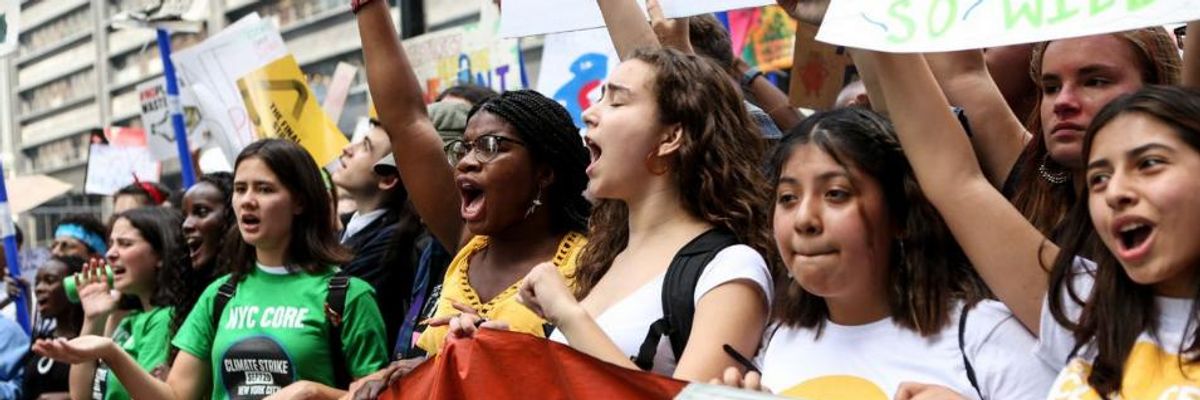As a seventeen-year-old, I--like many young people--find my youth dedicated to the fight for climate justice. Being the first American generation in my family--who immigrated from Kingston, Jamaica--the climate crisis is something that directly affects my community.
I grew up in New Jersey, the Garden State, in a multiple-family home resting in the center of a safe neighborhood. Although there were three apartments, the place felt interconnected into one big house because all of my neighbors were relatives from the Caribbean. Every summer, a handful of cousins from Kingston would immigrate to America and crash on our couches. Many are still in the process of moving here, year by year, and they come bearing experiences and stories that continue to move me into action in the fight for true climate justice.
"I strike to advocate for climate justice for my family. I strike for the millions of people who are already being impacted by the climate crisis. I strike for my own future. I strike for the future of youth across the world. I continue to strike for real solutions and technology to combat this crisis."
While I love spending thrilling summers with amazing people, it does not escape me that the reason they are here is that their homes in Jamaica are no longer stable. Tropical storms and hurricanes take their toll on their coasts and beaches; droughts put strains on the agriculture and, in turn, affect the economy, infrastructure, and livelihood. Much of the vast lands that were owned were sold to make ends meet, and to support the new generations in countries far from the sweet Caribbean coasts where my grandfather was raised. As a young kid, I didn't yet know about the cascading effect that living in an active hurricane basin had on my loved ones. These facts, that I was eating and sleeping and playing with frontline youth and refugees of climate disaster, were not things that I was privy to as a child.
As I grow older and more aware of the reasoning behind this migration, stories of my family's fight in their old homes became ingrained in me. This is something I struggled with in the past and continue to struggle with today. However, I did not immediately become a climate activist after hearing these experiences.
Initially, a few years ago, I decided that I wanted to take a more deductive approach to the issue and did a lot of research about climate science. As I go through my teenage years, climate science has become a true passion, tackling issues such as: how can we prevent the systematic rise of global temperatures; the melting of ice caps; the advance of our waters on land; the whipping convection currents throwing our weather into constant disaster? How can we improve upon carbon sequestration and storage techniques? How can we develop enhanced photosynthesis and more efficient biofuels?
When we do our research, we find that much of these upcoming technologies are being created and honed. But not enough, evidently. This is because, for our climate solutions to work and be implemented into society, it requires a political will to change. We need politicians who care enough about our lives to to put funding towards climate technology. We must demand representatives who will prioritize those on the front lines and give them real solutions. We require a government that will listen to those that are suffering now; to those whose homes were ravaged by hurricanes; to those who have been screaming for help for decades. Instead, there is political inertia; indifference; apathy. It shouldn't have fallen on my generation to change the political landscape. But it is, and we're not missing our opportunity to build a livable future.
That's why we are striking and will continue to strike. That's why my family is fleeing their home. That's why we brought almost 300,000 people together last Friday to march across New York, together with over seven million people worldwide over the last week.
When children all across America were immobilized by the Polio virus, millions of dollars were poured into vaccination techniques. However, when millions of children across the world are being harmed by fossil fuel industries and greedy corporations, our representatives have nothing to say? When children were sick and dismembered due to long hours of labor using dangerous machinery, child labor legislation was made to protect them. Where is our protection now? Today, there is a phony debate. There is disbelief and there is ignorance.
Children and youth are being attacked and our future threatened. Youth in Flint face health impacts and developmental issues; kids in Brazil live under a cloud of smoke; young people are displaced by flooding in India; children in the Bahamas are suffering from the aftermath of Hurricane Dorian. The list goes on and on.
I strike to advocate for climate justice for my family. I strike for the millions of people who are already being impacted by the climate crisis. I strike for my own future. I strike for the future of youth across the world. I continue to strike for real solutions and technology to combat this crisis.
We need our government to take action; we need elected officials who care; we need every single decision-maker at all levels to treat the climate crisis like the emergency it is, just as we treated the crises of the past. We need everyone to join young people, frontline youth and Indigenous peoples around the world--because we will not stop, because we have no other choice.
This is our future and we will fight for it because This Is Zero Hour.
